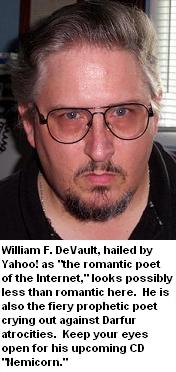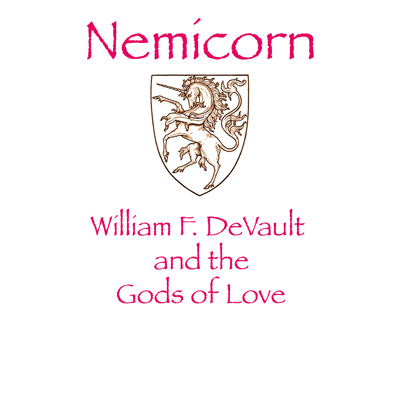William F. DeVault's Nemicorn
How the Gods of Love Must Weep at Darfur!
 William F. DeVault is one hard-working poet, driven, it seems, to produce master works that survive time. As stated on the poet's website, DeVault is also "a coiner of words, including nemicorn (a black unicorn or personification of mythic, obsessive love), amomancy (the weaving of words to create emotion) and theocricide (literally, the killing of God, a willful act against one's own belief system)." Armed with these definitions, listeners should come to his latest spoken word CD offering, Nemicorn, which includes pieces entitled "Theocrocide," Amomancy," and "Again the Nemicorn," anticipating a magic journey into romantic mythology but also the opportunity to meditate in "the church of poetry."
William F. DeVault is one hard-working poet, driven, it seems, to produce master works that survive time. As stated on the poet's website, DeVault is also "a coiner of words, including nemicorn (a black unicorn or personification of mythic, obsessive love), amomancy (the weaving of words to create emotion) and theocricide (literally, the killing of God, a willful act against one's own belief system)." Armed with these definitions, listeners should come to his latest spoken word CD offering, Nemicorn, which includes pieces entitled "Theocrocide," Amomancy," and "Again the Nemicorn," anticipating a magic journey into romantic mythology but also the opportunity to meditate in "the church of poetry."
DeVault's work on Nemicorn signals the poet's evolution from a poet of the page to a poet of the stage. From a music and delivery standpoint, listeners will find some pieces on Nemicorn more sophisticated than pieces on DeVault's first CD, The Last Romantic Verb. He slides from soft poetic whispers on pieces like "The Faerie (Strange but Beautiful)" with its gentle keyboard to blood-rushing rhythms on "Thunder Out of Vahalla." The Vahalla piece can almost be described as catchy like a rock song with its formal rhyme scheme and vibrant drums.
Suggesting the poet struggles between a love of pure poetry a cappella in the buff and an appreciation of poetry's roots in music, DeVault may surprise some of his audience when they realize he doesn't utter a word on the piece "Brigit." It's an instrumental composition sans recitation. But "Brigit" may not be a sign that he's drifting more toward music. Perhaps its inclusion indicates the poet is generous enough to let the musicians who helped him produce Nemicorn shine. He calls this band the Gods of Love, and "Brigit," a reference to one of his muses, stands as a lovely break from spoken word to words unspoken.
Regarding his own musical skills, DeVault said in an interview, "I have no musical background. I have been lightly tutored, recently, by an old friend of mine, Alan MacDonald, in music theory,
 and have just, in the last year, started working with Apple's Garage Band to see if David Bowie was correct when he once stated that we had reached a point, technologically, where art would be the province of conceptual artists, as the tools existed to bridge the gap between concept and creation. I am, so far, pleased with the results."
and have just, in the last year, started working with Apple's Garage Band to see if David Bowie was correct when he once stated that we had reached a point, technologically, where art would be the province of conceptual artists, as the tools existed to bridge the gap between concept and creation. I am, so far, pleased with the results."
He added, "I play the computer keyboard and know what I like when I manage to get a sound that works for me." DeVault wants to learn to play the guitar "the real world," and said, "That is what front men most often do, and I am too nervous without something to do with my hands to just be a microphone guy."
The CD, however, does have its subdued musical moments. One of the more potent pieces on Nemicorn, Thetis," has no music at all; thus, the listener enjoys the beauty DeVault's sexy, naked voice. In addition, a wonderful treat with little music is "Love Gods (Multivox)." It uses traditional choral voice recitation, reminiscent of the ancient Greek Chorus. The piece shows that DeVault is taking spoken word beyond the norm of static recitation with beats behind. "Love Gods" has an otherworldly feel.
Amomancy, 19-minutes-plus length, feels more like his first CD in the sense that it features a collection of poems with one poem sliding into another. Like his definition of the word "anomancy," the piece weaves a tapestry of emotions in the listener's heart, reminding one of a symphony with individual movements but one unit.
Another aspect of not only Nemicorn, but also his first CD, is DeVault's repetition of spiritual themes such as the killing of gods, the purification of sight, the search for truth, and battles against arrogance and ignorance.
 For instance, the CD includes "Darfur (Jesus Wept)," the poet's cry against the majority society's silence on Darfur atrocities. In a press release about "Darfur (Jesus Wept)" issued October 11, DeVault said, "I've not changed my mind on the necessity of romantic love in the world, in my life. But, when there is a horror of this degree festering in plain sight, how can my desires, my needs, be anything more than a flyspeck? We're talking genocide, here. Genocide. The intentional slaughter of hundreds of thousands of children, women and men."
For instance, the CD includes "Darfur (Jesus Wept)," the poet's cry against the majority society's silence on Darfur atrocities. In a press release about "Darfur (Jesus Wept)" issued October 11, DeVault said, "I've not changed my mind on the necessity of romantic love in the world, in my life. But, when there is a horror of this degree festering in plain sight, how can my desires, my needs, be anything more than a flyspeck? We're talking genocide, here. Genocide. The intentional slaughter of hundreds of thousands of children, women and men."
He's received an outpouring of support for his stand on Darfur. He even received a request from a Catholic radio station in Canada to play the poem on the air. A concern for justice belies DeVault's spiritual nature. He is an ordained minister, having "been admitted into both the Southern Baptist church and the Episcopal Church." However, he considers himself a Quaker, a member of the Society of Friends.
Throughout Nemicorn from "Damascus Movement" and its mention of Aphrodite to the final track "Again, the Nemicorn" with "vows to goddess sworn," DeVault keeps to his signature romantic, mythic themes--gods, goddesses, the misunderstood Nosferatu, and mythic beast of his own creation, the nemicorn. Spoken word lovers will appreciate the entire work as a unique and provocative offering in the genre.
Links
Copyright � 2006 Nordette Adams
